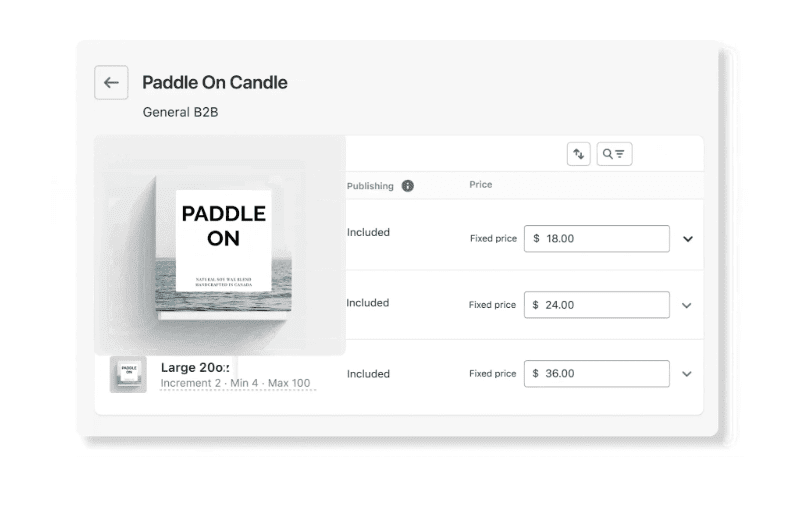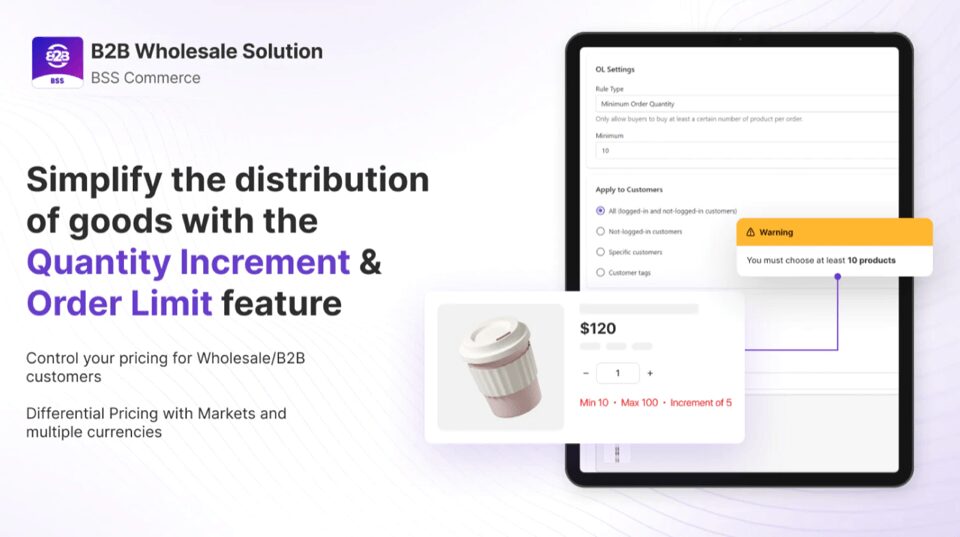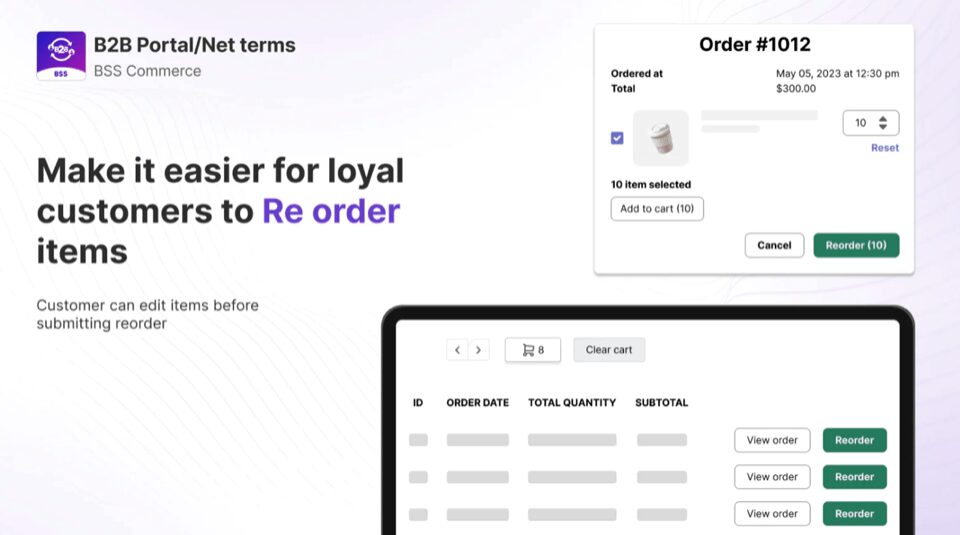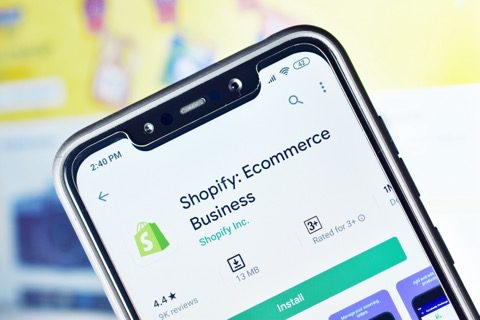Source: Shopify
Commanding an impressive $55 billion in quarterly merchandise value in Q2 2023, Shopify has dominated B2C for years. Interestingly, Shopify has also established itself as one of the go-to choices for complex business-to-business (B2B) brands, backed by a reliable ecommerce infrastructure and a constant stream of updates. Find out if Shopify meets your enterprise ecommerce needs with this guide from Coalition Technologies.
Table of Contents
The Many Faces of B2B
B2B might sound simple enough as a concept, but it’s hardly a monolith. This platform supports all major variations of B2B operations, including:
- Wholesale: Wholesalers purchase bulk goods from distributors or directly from manufacturers, selling them to retailers (or consumers) in turn. Wholesale has been one of Shopify’s fastest-growing segments, with some merchants experiencing 2x growth in 2024. Wholesale B2B Shopify merchants can use features like custom pricing and minimum order quantities to reward their loyal customers and set custom prices based on order volumes.
- Distributors & Manufacturers: Distributors work hand-in-hand with manufacturers, handling logistics and marketing. Supply chain-oriented features like fulfillable inventory, automated fulfillment, and order tracking can make distribution easier.
- B2B2C: Business-to-business-to-consumer models can be seen as hybrids of B2B and B2C models. A B2B2C operation usually serves as a middleman between the manufacturer and the consumer. Shopify features like custom storefronts and separate customer accounts for B2B and B2C consumers are ideal for B2B2C brands.
For simplicity’s sake, we can summarize a few general characteristics of B2B ecommerce on Shopify.
| B2B | B2C |
| Purchases are driven by necessity + relationship between the businesses | Buyers are driven by demand/emotional impulses |
| Purchases can involve multiple steps | Single-step purchase process |
| Orders can require the input of multiple parties | Orders involve a single buyer |
| Sometimes involves deferred and complex payment methods | Simple, usually immediate payments |
| Custom pricing, based on buyer relationships | Fixed prices |
What’s New For B2B on Shopify?
The Winter ‘24 Edition was the platform’s last major update, introducing sweeping new features for both B2C and B2B merchants on Shopify. We’ll be focusing on the two biggest new changes for B2B merchants.
- User Permissions: This new feature makes life much easier for store owners. User permissions enable merchants to control access to their store for different users. With these permissions, merchants can set up roles for their staff members and B2B customers, allowing them to grant access to specific store areas, such as order processing, product management, and customer data.
Custom permissions give managers total control over how staff members and customers interact with their store based on their unique responsibilities. Ultimately, this creates a more streamlined purchasing experience for all parties. This feature mainly benefits larger stores or stores with complex selling models involving many moving parts. Shopify’s support for complex B2B ecommerce models is an excellent sign of things to come. - Fulfillable Inventory: B2B Shopify merchants often work with multiple distributors located across multiple states (or even countries!). Managing an inventory can be incredibly difficult in scenarios like these due to legal and logistical restrictions. A product might be easily shipped to one state and unavailable in a neighboring state.
Fulfillable inventory is a great new feature that solves complex logistical issues. Merchants can use it to ensure that customers always receive up-to-date, region-specific information about the products available in their particular markets. With the addition of this feature, we expect to see a marked reduction in issues like overselling and unnecessary cancellations.
Okay, But Is Shopify Good Enough For B2B Yet?
Updates are always great, but B2B merchants need a reliable platform with tailored features to support their complex operations from day 1. Let’s look closer at Shopify’s B2B ecommerce features.
Customizable Pricing and Discounts
Versatility is everything in the B2B arena, where corporate relationships can also be a currency. B2B stores can leverage the platform’s integrated support for custom pricing to create different tiers for their enterprise customers. This means managers can set different prices based on various factors, including order quantities and shipping distance.

Integrated support for this B2B Shopify feature means that merchants don’t need to install a plugin to use it. For example, a garment wholesaler can offer a 20% discount on all orders over $750 just by heading to the ‘Price Lists’ tab in their Shopify dashboard.
Powerful Inventory Management System
Average transit times for ecommerce orders were estimated to be around 2.4 days by the end of 2021, a number that has most likely fallen even further with the advent of quick commerce. Whether it’s individual consumers or enterprise buyers, fast order fulfillment is now the norm.
Shopify’s robust inventory management features help merchants meet those expectations by creating a smoother experience for customers and managers.
- Manage extensive inventories across multiple locations to ensure your customers always have access to your products, all with a single dashboard.
- Never run out of stock again. Shopify’s B2B dashboard includes automatic reorder points that are triggered when your inventory reaches a certain threshold. These reorder points are calculated based on daily sales figures.
Custom B2B Experiences
All that talk about integrated features doesn’t mean Shopify is a rigid B2B ecommerce platform. From full-fledged support for headless ecommerce to support for customer-specific product publishing, B2B merchants can create unique experiences for every client.
Suppose your B2B operation sells products to a school, a large office, and a restaurant. Naturally, each of these buyers has different needs and budgets. As a Shopify B2B merchant, you can use customer-specific product publishing to create custom catalogs for each of those buyers. This catalog would display products that are most relevant to them, with prices automatically adjusted based on the buyer.
Global Expansion
Reaching new markets doesn’t have to be a hassle. Shopify’s out-of-the-box support for global expansion can make international sales significantly easier with features like:
- Localized storefronts
- Automatic translations
- Tax exemptions
92% of online shoppers prefer buying products in their local currency. With features like automatic currency conversion, you can tap into global demand without manually localizing your store for each region.
Flexible Payments
Shopify’s B2B solution recognizes the need for payment flexibility. Cash flow issues, cross-border payment barriers, and security concerns can all lead to delays in the purchase process. As a merchant, you can use the payment terms feature to assign a period a buyer has before paying for their order. This can be upon checkout, up to 90 days after checkout, or at the time of fulfillment.
Source: Shopify
Similarly, support for various payment methods and credit card vaulting means buyers can save their info for a smoother re-purchase experience. Vaulting is particularly useful for B2B ecommerce buyers on Shopify since many of these transactions are recurring.
Go B2B with Shopify
The hefty updates, powerful customization, and easy-to-use interface all make Shopify a formidable platform for enterprise operations. Even complex B2B brands can now set up shop and start shipping almost immediately, and the B2B experience is only going to get better as new updates roll in.
Make the most of your Shopify store with a custom ecommerce solution designed to enhance your conversions. Contact Coalition Technologies today for a free strategy review, and find out how our ecommerce experts can help you build a truly one-of-a-kind B2B experience.
For more info on launching on Shopify, checkout our The Most Comprehensive Shopify Store Setup Guide Ever to kicking off your first store.





